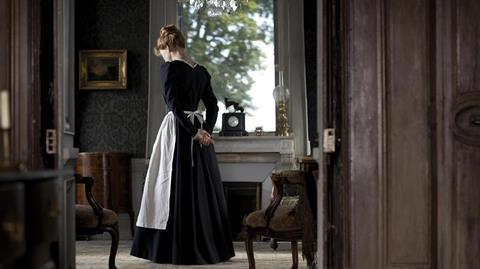Dir: Benoit Jacquot. France-Belgium. 2015. 96mins

Following on from film masters such as Renoir and Bunuel is never an easy task, and short of coming up with a powerful new approach to Octave Mirbeau’s Diary Of A Chambermaid, written at about the turn of the 19th century, it could be argued there is no sense in going back to it once again. But Benoit Jacquot does just that, claiming his new version is closer to the novel than its two previous adaptations.
Seydoux never manages to assemble all of Celestine’s various features into one convincing character, while the social, sexual and political nuances in the script are well-established clichés.
This may very well be the case, but it is also true this version fails not only to breathe new life into the character of Celestine (Lea Seydoux) whose point of view, as she moves from one employer to another, documents to a great extent the end of an era, but has nothing significant else to offer our times that hasn’t been mentioned countless times before.
Unlike Bunuel’s 1964 sexually acerbic Jeanne Moreau starrer and Renoir’s earlier, Hollywood-made, romantic 1946 version with Paulette Goddard - both self-sustained coherent adaptations which fit the point of view, vastly different in each case, of the two directors - Jacquot’s script (written with Helene Zimmer) of Diary Of A Chambermaid (Journal d’une femme de chambre) offers no new insights, while his direction decoratively stumbles over a collection of cardboard characters bound to leave most present day audiences indifferent.
A smart, independent, elegantly attired, strong-willed young woman, Celestine’s services as a chambermaid are in great demand despite her spunky conduct. Jacquot’s script starts with her unenthusiastically accepting a position with the Lanlaire household in the provinces, a job that turns out to be less than a bed of roses. M. Lanlaire (Herve Pierre) is a lecherous bore she can handle, but Mme Lanlaire (Clotilde Mollet) is a tyrannical shrew mistreating her servants, and Celestine in particular, with a vengeance. Luckily, there is the gardener, Mr. Joseph (Vincent Lindon), strong, silent type, just the kind to induce sexual fantasies into the mind of every full-bodied woman. At least this is how it works in the movies.
Entering the scene with a snotty, superior, smile on her face, her eyes looking down on the rest of the world, it is a surprise to find Celestine, in one of the flashbacks, a compassionate companion to a consumptive teenager and discovering she is certainly no prude, even if she disdains Mr. Lanlaire’s clumsy advances. Her passion for Vincent, pretty transparent from the very beginning, is kept smoldering but very much in evidence for a long time before it erupts towards the end, when, despite her unproven suspicions that he might be responsible for the grisly murder of a 12 year-old-girl, and though she finds out he is a rabid anti-Semitic fascist and proud of it, she is only too happy to fall into his arms. The charm of such brutes is obviously too much even for such a level-headed girl as Celestine.
Fearful the camera would not tell the full story, or possibly not trusting the intelligence of his audience, Jacquot insists on repeating scenes, throwing in pieces of dialogue and adding inserts to drive his points home, long after they are perfectly clear. Seydoux never manages to assemble all of Celestine’s various features into one convincing character, while the social, sexual and political nuances in the script are well-established clichés. That includes the pronounced French anti-Semitism Jacquot singles out in his press book, which had already played an important part in Bunuel’s 1964 version.
Production companies: Les Films du Lendemain, JPG Films, Les Films du Fleuve
International Sales: Elle Driver, sales@elledriver.eu
Producers: Kristina Larsen, Jean-Pierre Guerin
Screenplay: Helene Zimmer, Benoit Jacquot
Cinematography: Romain Winding
Editor: Julia Gregoire
Production designer: Katia Wyszkopf
Music: Bruno Coulais
Main cast: Lea Seydoux, Vincent Landon, Herve Pierre, Clotilde Mollet, Vincent Lacoste, Melodie Valemberg, Patrick d’Assumcao, Josephine Drenne, Dominique Raymond





















